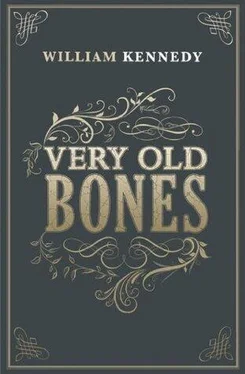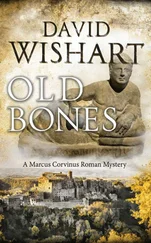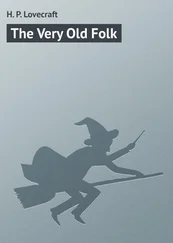For Chick the year 1954 was full of crisis, a climactic time in his life. A failed priest in Sarah’s eyes, Chick had been introduced to Evelyn Hurley, a handsome cosmetics saleslady at the John G. Myers Department Store, during a New Year’s Eve party at the Knights of Columbus in 1937, by the Times-Union newspaper columnist Martin Daugherty. The introduction was followed first by Chick’s privileged glimpse of Evelyn Hurley eliminating a wrinkle in her silk stocking by the most modest elevation of her skirt, that elevation the equivalent to Chick of a wild aphrodisiac; and second, by Chick’s intense and private conversation with Evelyn immediately thereafter, during which he became acutely aware of the audible friction created when she crossed her legs under the table, her silk stockings sliding one upon the other and creating, in Chick’s heart and soul, the phenomenon of love at first sound.
Chick then pursued her with ardent respect and found his ardor reciprocated, but found also that Evelyn, a widow, was a woman of the world in ways that Chick only hoped to be a man of the world; and so for seventeen years the Chick-and-Evelyn courtship frequently approached, but never arrived at, ardor’s ultimate destination. Chick was too loyal a Catholic to use prophylactics, Evelyn too alert to possibility to allow access to herself without them.
Marriage was, of course, the answer, but impediments prevailed, principally in Chick, who, even after he bought Evelyn an engagement ring in the tenth year of their courtship, chose to believe he was seeing her circumspectly. None in the city except himself thought it much of a secret, not even his sister Sarah, the chief impediment, who for years refused to acknowledge that Evelyn existed on the planet, and announced often at dinner that the Phelan credo, in the abstract, allowed no truck with widows, or divorcees, or women of loose character. Sarah, at a neighbor’s wake, overheard a man describe someone she assumed to be Evelyn as “loose as ashes and twice as dusty” and, understanding the import of the statement without grasping its particulars, thereafter actively did all she could to discourage Chick from his pursuit, never, for instance, allowing him to bring Evelyn into the house during the seventeen-year courtship.
It was during the very early twilight of a June evening in 1954 that Chick found himself in a duel of screams with Sarah, he reacting to Evelyn’s ultimatum that if he did not marry her she would leave Albany and go alone to Miami Beach to take work as the hostess of a luxurious new Collins Avenue delicatessen that was about to be opened by a friend who had moved to Florida and, with prudent investment, found himself with money to burn. And how better to burn it than cooking corned beef and blintzes?
Sarah and Chick each lacked novelty in their arguments — the much-discussed moral position on widows and designing women, the depravity of men’s desires, the holy priesthood (“Once a priest, always a priest”), maternal wishes, Catholic antipathy to Florida and especially Miami Beach, and, the ultimate appeal, family loyalty: “What will become of us if you leave?”—being Sarah’s enduring salvos; and Chick’s — his fury at being thought of as a priest (“I was never a priest, only a seminarian”), the right of men, even Albany Irishmen, to marry, the right not to be interfered with by sisters, the love for Evelyn (newly announced within the past week), the last chance for happiness, the only love he’d ever known in this goddamned life (“Don’t you swear at me over your concubine”), and the ultimate truth: that he was goddamn sick and tired of being a slave to this family, goddamn sick and tired of not being appreciated, goddamn sick and tired of this stinking town and this stinking street and. . and there Chick’s tirade was interrupted by the front door bell; and he opened it to see a policeman standing on the stoop holding Tommy by the arm.
“Mr. Phelan?”
“Yes.”
“Is this man your brother?”
“He is. What’s the problem?”
“Well, he’s more or less under arrest. It’d be better to talk inside.”
Chick saw another policeman sitting in the squad car parked in front of the house and recognized Eddie Huberty, who used to play left field for Arbor Hill in the Twilight League. Chick waved a small hello to Eddie and backed into the house to let Tommy and the policeman into the parlor.
Molly, who had been upstairs in her room trying to shield her ears against Sarah’s and Chick’s eternal arguing, came down the stairs at the sound of the doorbell, and stopped behind Sarah as the policeman entered and took off his hat. He stood beside Tommy, who could look only at the floor, while Chick, in his shirtsleeves and suspenders, commanded the moment.
“Has he done something, officer?” Chick asked.
“It seems he has. We had a complaint from a woman on Ten Broeck Street that he followed her home from Downtown.”
“He always walks on Ten Broeck Street,” Chick said. “All his life. Did he do anything to the woman?”
“It seems he did,” the policeman said, and Chick detected a small smile on the man.
“It was Letty Buckley, wasn’t it?” Sarah said.
“Matter of fact it was,” said the officer. “How’d you know?”
“I know that one,” said Sarah. “She’s a troublemaker.”
“I don’t know about that,” said the officer. “She called us and said your brother followed her two days in a row, always walking behind her, so the third day we followed along and saw him behind her, sure enough, carrying a cane, and when she got to her front stoop he hooked the neck of the cane under her skirt and lifted it up, up to her hips, and she screamed. He tipped his hat to her and kind of twirled his cane, and then he walked away. That’s when we picked him up.”
“Did you do that?” Sarah asked Tommy, poking his shoulder with one finger.
Tommy made no acknowledgment, stared at the floor.
“Did you, brazen boy? Did you?” Sarah screamed, and Tommy, crying, nodded yes.
“Don’t yell,” Molly said, pushing past Sarah and taking Tommy by the arm. “Come and sit down, Tom,” she said, and she led him to the love seat and sat beside him.
“Is he under arrest?” Chick asked.
“Not yet,” the policeman said, and added in a whisper, “Mrs. Buckley hasn’t filed a complaint, and I’m not sure she really wants to. Probably get in the papers, you know, if she does. She just thinks he oughta be kept under control.”
“We can guarantee that, officer,” Chick said.
“You bet your life we can,” Sarah said.
Tommy whimpered.
The policeman offered a faint smile to Chick and Sarah. “More of a joke, really. He didn’t hurt her, and nobody saw what he done except us. And, o’ course, Miss Buckley. Quite a surprise to her, musta been.” And he laughed. “Just keep him close to home.”
Chick nodded and smiled, and as they walked out to the stoop the policeman said softly to Chick, “Really was funny. Her skirt went about as high as it could go. He’s pretty clever with that cane.”
“We’ll see it doesn’t happen again, officer. And you wanna bring over a coupla tickets to the Police Communion Breakfast I’ll buy ’em from you.”
“I’ll do that,” the policeman said, and he got back in the prowl car. Chick waved again to Eddie Huberty.
Tommy’s head was still bowed, his sisters watching him in silence, when Chick reentered the parlor, feeling that the policeman’s smile had broken the tension. Chick tried to convey that in his tone. “Tom, what the hell did you do that for?”
Tommy shook his head.
“You know Miss Buckley? You ever been in her house?”
“No,” Tommy said.
“You just like her looks, is that it?”
Читать дальше












